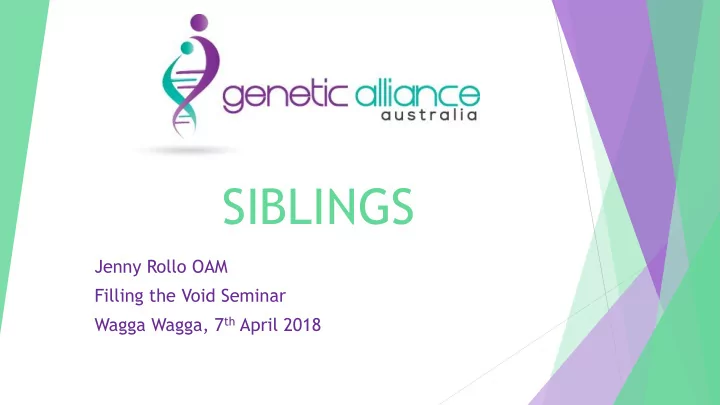

SIBLINGS Jenny Rollo OAM Filling the Void Seminar Wagga Wagga, 7 th April 2018
Diagnosis of a Genetic Condition
The Journey: We’re all in this together
Issues The sibling relationship will usually be longer than any other relationship within the family. Young siblings are prone to feeling responsible for their sibling's and their parents‘ well -being. Siblings often feel a sense of responsibility for their sibling beyond that felt by their peers. Siblings may assume guardianship for their brother or sister when their parents die or are no longer able to care .
Some points to consider Sibs often develop a range of admirable personal qualities and feel enriched by growing up in their family Some sibs are more tolerant and understanding of individual differences Some sibs take great pride in their brother or sister’s achievements Some sibs go on to work in helping professions
Concerns Siblings May Have Siblings grow up with much stress but do not have the coping skills to deal with their experiences. Various fears, anxieties May worry that the condition is contagious, or was caused by something they have done Older sibs are probably concerned about their own reproductive future Fear that they will be expected to take over care of their brother or sister as an adult Feel anger, embarrassment, guilt Feel the need to be the “good child”, to achieve - and then feel guilt about their abilities
How these concerns might affect children Withdrawal Anxiety Lowered self-esteem Act out feelings with aggression or attention seeking Develop sleep problems or physical complaints, self harm Social difficulties
Siblings need: Information about the special needs Opportunities to express feelings To feel special themselves, and valued Strategies to deal with difficult situations Contact with siblings in a similar situation Social support
Comments from sibs Some concerns mentioned by siblings include: Feelings of isolation Lack of information Attention Anger and resentment Guilt
Comments from Sibs Pressure to be perfect Grief and sorrow Independence The future
Comments from sibs What is it like to be a sibling? “ Sotovf harde ” (sort of hard) “My brother makes me happy” “They get all the attention” “Good sometimes” “I wish I was the only child” “Fun” “How come HE never has to wash up?”
How can we help our kids? One:one time with parents Encourage own interests Source age-appropriate information and peer support for them through: #Genetic counselling #Other siblings with the same or different conditions #Condition-specific support groups #Genetic Alliance Australia
Give Siblings opportunities to build their own support networks Friends Other special needs siblings Family – cousins, aunts, uncles Interest groups Sport Drama Play dates at home and outside the home Time and space to just “be”
Supporting Siblings Build a resilient family through: Communication Making time a priority Keeping perspective Building support networks Seeking professional assistance Respite
Allow siblings to express their feelings
Fact: Most children will cope better with stress if they feel listened to and understood
Celebrate!
Positive Outcomes With support the whole family will function more positively Siblings are more likely to develop strength, tolerance and responsibility.
Supportive relationships as adults…where every member of the family recognises the value of the others
https://www.sbs.com.au/ondemand /video/981972035757/insight- sibling-carers
Thank you Siblings Australia - www. siblingsaustralia .org.au Carers NSW - http://www.youngcarersnsw.asn.au Genetic Alliance - Filling the Void www.geneticalliance.org.au
Recommend
More recommend